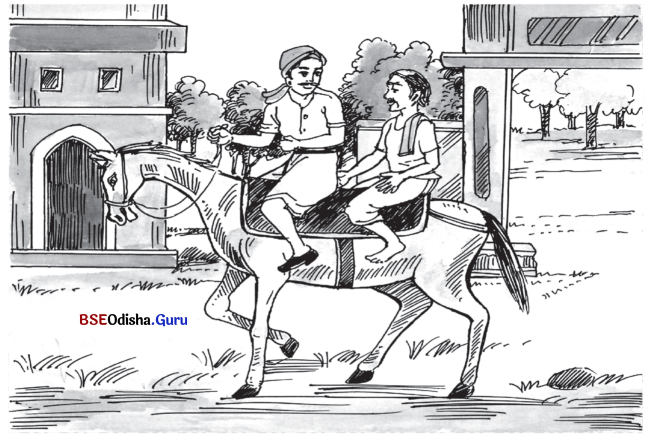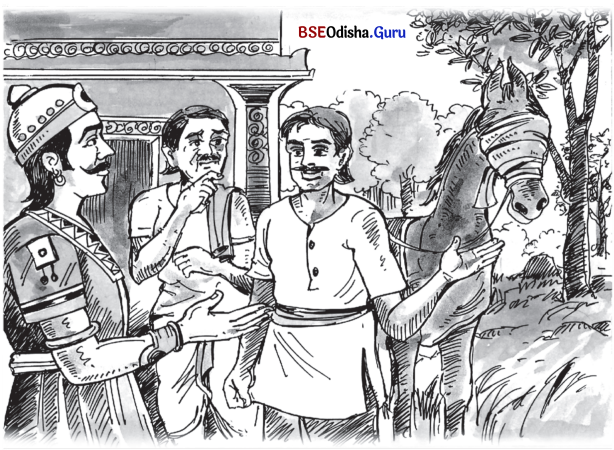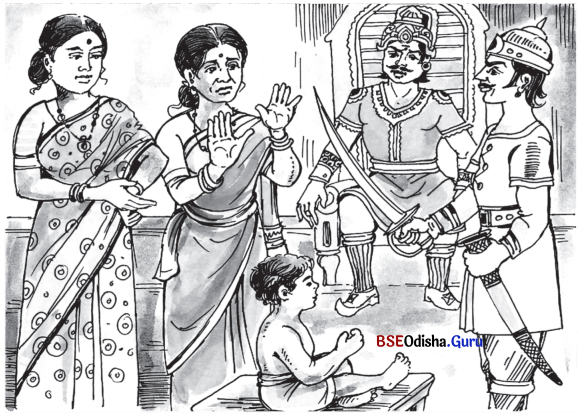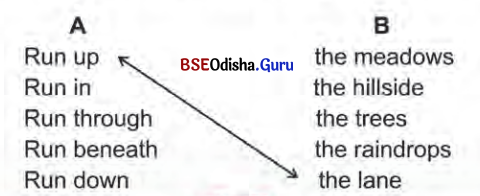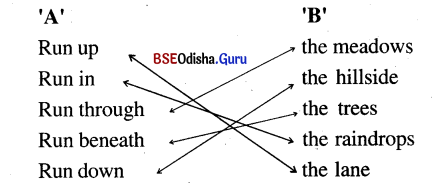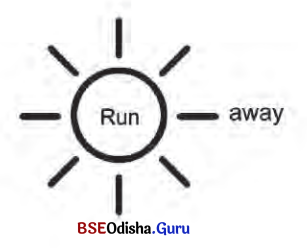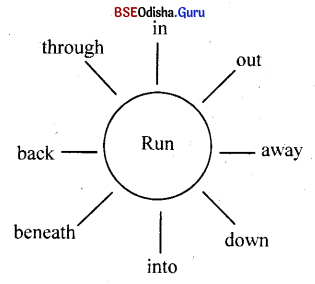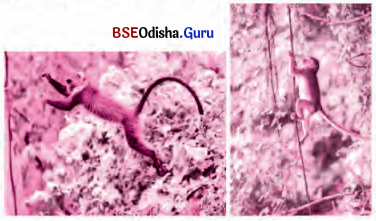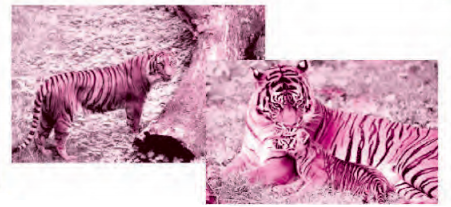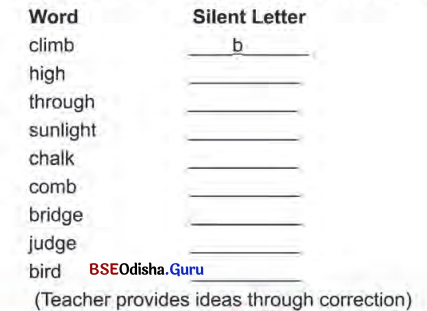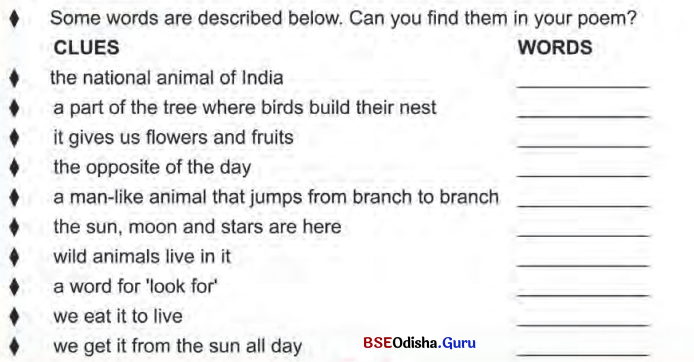Odisha State Board CHSE Odisha Class 12 Invitation to English 2 Solutions Non-Detailed Chapter 1 The Doctor’s Word Textbook Exercise Questions and Answers.
Class 12th Invitation English Non-Detailed Chapter 1 The Doctor’s Word Question Answers CHSE Odisha
The Doctor’s Word Class 12 Questions and Answers
Unit I
Gist :
Dr. Raman was a veteran doctor. He was the epitome of truth. Therefore, the patients gave much importance to his opinion. Dr. Raman was averse to giving mere opinion. Instead, he gave his opinion after testing. The patient’s life depended on what he said. He was cool in the treatment of his patients. He did not like to assure them saying soothing words. A glimpse of the least sign of hope made Dr. Raman prepare to work. Once he treated his patient, he never looked back. The patients visited Dr. Raman when they were hopeless. They did not come earlier for the sake of paying him visiting fee of twenty-five rupees.
ସାରମର୍ମ :
ପ୍ରସିଦ୍ଧ ଡାକ୍ତର ରମଣ ସତ୍ୟର ଉପାସକ ଥିଲେ । ସେଥିପାଇଁ ରୋଗୀମାନେ ତାଙ୍କ କଥା ଉପରେ ଦେବା ସହ ବିଶ୍ଵାସ ମଧ୍ୟ କରୁଥିଲେ । ତାଙ୍କର କଥା ଉପରେ ରୋଗୀର ଜୀବନ ନିର୍ଭର କରୁଥିଲା । ସେ ବହୁତ ଥଣ୍ଡା ମିଜାଜରେ ରୋଗୀମାନଙ୍କ ଚିକିତ୍ସା କରୁଥିଲେ । ସେ ସାର୍ଚ୍ଚନାମୂଳକ କଥା କହି ରୋଗୀମାନଙ୍କୁ ଭରସା ଦେବାକୁ ପସନ୍ଦ କରୁନଥିଲେ । ଶେଷ ଆଶା ଥିଲା ପର୍ଯ୍ୟନ୍ତ ସେ ମଧ୍ଯ ରୋଗୀମାନଙ୍କର ସେବା ଓ ଚିକିତ୍ସା କରୁଥିଲେ । ଚିକିତ୍ସା ପ୍ରକ୍ରିୟା ଆରମ୍ଭ କରିବା ପରେ ସେ ରୋଗୀକୁ ନବଞ୍ଚାଇ ଛାଡୁନଥିଲେ । ଯେତେବେଳେ ରୋଗୀମାନେ ଆଶାହୀନ ହୋଇ ପଡ଼ୁଥିଲେ, ସେମାନେ ଡାକ୍ତର ରମଣଙ୍କ ନିକଟକୁ ଆସୁଥିଲେ । ସେମାନେ ଆଗରୁ ଆସୁ ନ ଥିଲେ ଯେହେତୁ ସାକ୍ଷାତ୍ କରିବାର ଫିସ୍ ୨୫ ଟଙ୍କା ଥିଲା ।
![]()
Glossary :
on his last legs : weak and likely to collapse(ଶେଷ ଅବସ୍ଥା)
obvious: clear(ପରିଷ୍କାର)
shirk: avoid (ଏଡ଼େଇବା)
ominous: inauspicious(ଅଶୁଭ)
association: companion( ସାହଚର୍ଯ୍ୟ)
quick: fast(ନ ନେଇ ପାରିବା ଅବସ୍ଥା)
wavering: indecision, to be unable to take decision
whitewashing: hiding somebody’s errors or unpleasant facts (ସତ୍ୟ ଲୁଚାଇବା) ସୃଷ୍ଟି କରିଥିଲା
bred: ପୋଷ୍ୟ
curt: short (ସଂକ୍ଷିପ୍ତ)
dope: hope (ଆଶା)
glimpsed: saw faintly
faintest: କ୍ଷୀଣତମ
sign: ଚିହ୍ନ
rolled up his sleeve: prepared to work (କାର୍ଯ୍ୟ କରିବାକୁ ପ୍ରସ୍ତୁତ ହେଉଥିଲେ )
stepped: arrived (ପହଞ୍ଚୁଥିଲେ)
truthfulness: ସତ୍ୟତା
reason: କାରଣ
opinion: ମତାମତ
valued: much attention is paid (ଗୁରୁତ୍ଵ ଦିଆଯାଉଥୁଲା )
mere : କେବଳ
pronounce a verdict: declaring a decision (ରାୟ ଘୋଷଣା କରିବା)
hung : ଝୁଣ୍ଟିବା
unduly: ଅଯଥା
agreeable words: pleasant words(ସୁଖକର କଥା)
arena: ମଞ୍ଚ
withdrew: retreated ( ପଛଘୁଞ୍ଚା ଦେଉଥିଲେ )
wrested: took violently from a person’s grasp (ମଲ୍ଲୟୁଦ୍ଧ)
the prize: (here) life of the patient (ପୁରସ୍କାର)
Yama: Hindu God of departed spirits (ୟାମା)
Think it out:
Question 1.
Why did the patients visit Dr. Raman only when they were hopeless?
Answer:
The patients visited Dr. Raman only when they were in a critical condition. The doctorasked them why they had not come much before. The reasons were not far to seek. The patients were not willing to pay him visiting fee of twenty-five rupees so early. Besides, they did not feel the necessity of going to the doctor unless they found themselves in a hopeless stage. For them, there was something dangerous to be in the presence of Dr. Raman, because he promptly diagonised the patient.
Question 2.
What impression of Dr. Raman do you get from the passage?
Answer:
Dr. Raman is loyal to his profession in word and spirit. He knows well that a patient’s life depends on his words. He diagonises the patients promptly. He was decisive to the core. He doesn’t like to hide anything concerning the patient. Truthfulness is Dr. Raman’s forte. His short, sharp response to the patient’s condition is a case in point. He sticks to human values. He knows that soothing words cannot save the lives of patients. Dr. Raman doesn’t like hide anything from the patients. He waits till his patients recover.
Unit II
Gist :
Dr. Raman felt restless when he found his bosom friend Gopal in a critical condition. He walked down the memory lane. Forty years had elapsed. Their friendship had been kept intact. Family and profession hindered their meetings in a great measure. At times they dined together, went to the cinema and shared each other’s life and activities. Changing times, circumstances and activities had no effect on their friendship. It was excellent one. They had no contact for the last three months now. The sight of Gopal’s son sitting on a bench in the consulting room made him remember his friend. Dr. Raman talked to him and came to know about his friend’s illness.
![]()
ସାରମର୍ମ :
ଯେତେବେଳେ ଡାକ୍ତର ରମଣ ଜାଣିଲେ ଯେ ତାଙ୍କର ଅନ୍ତରଙ୍ଗ ବନ୍ଧୁ ଗୋପାଳ ଗୁରୁତର ଭାବେ ଅସୁସ୍ଥ ହୋଇଛି, ସେତେବେଳେ ସେ ବିଚଳିତ ହୋଇପଡ଼ିଲେ । ସେ ଦୀର୍ଘ ଚାଳିଶ ବର୍ଷର ବନ୍ଧୁତ୍ଵର ଅନ୍ତରଙ୍ଗ ମୁହୂର୍ତ୍ତଗୁଡ଼ିକୁ ମନେ ପକାଇଲେ । ପରିବାର ଓ ବୃତ୍ତି ତାଙ୍କ ମିଳନରେ ବାଧକ ସାଜିଥିଲା । ବେଳେବେଳେ ସେମାନେ ଏକାଠି ଖାଉଥିଲେ, ଏକାଠି ସିନେମା ଯାଉଥୁଲେ ଏବଂ ପରସ୍ପରର ଦୁଃଖ ଓ ସୁଖରେ ଅଂଶୀଦାର ହେଉଥିଲେ । ପରିସ୍ଥିତିର ପରିବର୍ତ୍ତନ ସେମାନଙ୍କ ବନ୍ଧୁତ୍ଵ ଉପରେ କୌଣସି ପ୍ରଭାବ ପକାଇ ପାରି ନଥିଲା । ତିନିମାସ ହେଲା ସେମାନଙ୍କ ମଧ୍ୟରେ କୌଣସି ଯୋଗାଯୋଗ ହୋଇପାରି ନ ଥିଲା । ଗୋପାଳର ପୁଅଠାରୁ ସେ ଗୋପାଳର ଅସୁସ୍ଥତା ବିଷୟରେ ଜାଣିବାକୁ ପାଇଲେ ।
Glossary :
soothing : comforting (ଆଶ୍ୱାସନାଭରା )
lies: falsehood (ମିଛ)
mopped: cleaned ( ସଫା କଲେ/ପୋଛିଲେ )
brow: forehead (କପାଳ)
kerchief: କିର୍ଚିଫ୍
beside: ପାଖରେ
dearest: most imtimate (ଅନ୍ତରଙ୍ଗ)
kindergarten days: ସ୍କୁଲ ଦିନରୁ
of course: ଅବଶ୍ୟ
wrapped: ଗୁଡ଼ାଇ
dine: ଭୋଜନ
classic friendship: excellent friendship (ଉତ୍ତମ ବନ୍ଧୁତା)
untouched: ଅସ୍ପୃଶ୍ୟ
circumstances: ପରିସ୍ଥିତି
crowded: ଭିଡ଼
got up: ଉଠିପଡିଲି
youth: ଯୁବକ
shy: ଲାଜୁଆ
Think it out
Question 1.
How does the writer describe the friendship between Dr. Raman and Gopal?
Answer:
The writer says that the friendship between Dr. Raman and Gopal spans forty years. It goes back to their school days. Family and profession have made their meetings infrequent. At times on a Sunday, Gopal waits patiently for Dr. Raman in the consulting room till the latter is free. They spend the day in dinning, going to the cinema and sharing each other’s life and activities. Their friendship that still remains untouched by changing times, circumstances and activities is an excellent one.
![]()
Question 2.
How did Dr. Raman come to know about Gopal’s illness?
Answer:
Hectic schedule had led Dr. Raman to forget his friend’s failure to call him in for three months. This fact occurred to him when he noticed his friend’s son sitting on a bench in the consulting room. It was one morning packed with patients. At the time moving to the operation room, Dr. Raman enquired of him about the purpose of visit. At that time he came to know about Gopal’s illness.
Unit III
Gist :
Dr. Raman was awfully busy, because it was an operation day. Then the doctor immediately went to his friend’s home and saw Gopal lying in bed. The doctor asked his wife many questions concerning his illness. Dr. Raman wished Gopal’s wife had summoned him earlier. A doctor nearby was treating him. Gopal’s family did not contact Dr. Raman, because they did not want to disturb him unnecessarily. They felt miserable. Dr. Raman started treating his friend without wasting time. He injected Gopal in the presence of the latter’s family members. Dr. Raman sat back in his waiting for the result. Loss of midday meal made him hungry. He went out for his lunch and came back soon. Dr. Raman apprised his friend’s wife of the necessity of operation and sought their son’s assistance. Gopal’s wife felt dizzy.
ସାରମର୍ମ :
ଡା. ରମଣ ବହୁତ ବ୍ୟସ୍ତ ଥିଲେ କାରଣ ଏହା ଥିଲା ତାଙ୍କର ଏକ ଅସ୍ତ୍ରୋପଚାର କରିବାର ଦିନ । ପରେ ସେ ସାଙ୍ଗେ ସାଙ୍ଗେ ତାଙ୍କ ବନ୍ଧୁଙ୍କ ଘରକୁ ଗଲେ ଏବଂ ଦେଖିଲେ ଯେ ଗୋପାଳ ଶଯ୍ୟାଶାୟୀ । ଡାକ୍ତର ଗୋପାଳଙ୍କ ସ୍ବାସ୍ଥ୍ୟ ସମ୍ପର୍କରେ ତାଙ୍କ ସ୍ତ୍ରୀଙ୍କୁ ଅନେକ ପ୍ରଶ୍ନ ପଚାରିଲେ । ଗୋପାଳଙ୍କର ପରିବାର ତାଙ୍କୁ କାହିଁକି ଆଗରୁ ଡାକିଲେ ନାହିଁ ବୋଲି ସେ ପଚାରିଲେ । ତାଙ୍କୁ ବିନା କାରଣରେ ଅସୁବିଧାରେ ପକାଇବାକୁ ଚାହୁଁ ନ ଥିଲେ ବୋଲି ସେମାନେ କହିଲେ । ସମୟ ନଷ୍ଟ ନ କରି ଡା. ରମଣ ଚିକିତ୍ସା ଆରମ୍ଭ କରିଦେଲେ । ଫଳାଫଳକୁ ଅପେକ୍ଷା କରି ସେ ବସି ରହିଲେ । ଦିନ ସମୟରେ ଖାଇ ନ ଥିବାରୁ ସେ ଭୋକିଲା ଅନୁଭବ କଲେ ଏବଂ ସେ ମଧ୍ୟାହ୍ନ ଭୋଜନ ଖାଇବାପାଇଁ ଗଲେ ଏବଂ ଖୁବ୍ ଶୀଘ୍ର ଫେରି ଆସିଲେ । ସେ ଗୋପାଳଙ୍କର ସ୍ତ୍ରୀଙ୍କୁ ଅସ୍ତ୍ରୋପଚାର କରିବାର ଆବଶ୍ୟକତା ଅଛି ବୋଲି କହିଲେ । ସେ ତାଙ୍କ ପୁଅଙ୍କ ସାହାଯ୍ୟ ଚାହିଁଲେ । ଗୋପାଳଙ୍କର ସ୍ତ୍ରୀ ଖୁବ୍ ଅସ୍ବସ୍ତି ଅନୁଭବ କଲେ ।
Glossary :
rushed off: ଶୀଘ୍ର ଗଲେ/ ଧାଇଁଗଲେ
lay: ଶଯ୍ୟା
as if in sleep: ଯେପରି ଶୋଇଛି
trouble: ଅସୁବିଧା
apologetic: କ୍ଷମାପ୍ରାର୍ଥନା କରିବା
miserable: sad (ଦୁଃଖ୍)
took off: removed (କାଢ଼ିନେଲେ)
sizzled: boiled (ଫୁଟାଇଲେ)
sterilizer: ନିରୂପଣ
shot in: ଗୁଳି ଚଳାଇଲା
on any account: ଯେକୌଣସି ହିସାବରେ
giddy: dizzy
sank down: ବୁଡ଼ିଗଲା
drug: medicine (ଔଷଧ )
essayed: tried (ଚେଷ୍ଟା କଲେ )
Snapped: କଥାରେ ବାଧା ଦେଲେ
gleamed: ଚିକ୍ଚିକ୍ କଲା
perspiration: sweat (ଝୋଳ)
eyelids: ଆଖ୍ୟାତାଗୁଡ଼ିକ
timidly: ଲାଜରେ
fatigue: tiredness (କ୍ଳାନ୍ତି)
famished: hungry (କ୍ଷୁଧାଇଁ)
midday meal: ମଧ୍ୟାହ୍ନ ଭୋଜନ
bear: tolerate (ଧାରଣ କରିବା)
strain: ଟାଣିବା
Think it out
Question 1.
Why didn’t Gopal’s wife call for Dr. Raman earlier?
Answer:
Dr. Raman went to his friend’s house, because the latter was critically ill. He found Gopal lying in bed. Skillful doctor as he was, Dr. Raman calmly enquired of his wife about his friend’s treatment. He learnt that a doctor nearby had been treating her husband. He asked her why she didn’t call him earlier. She failed to do so, lest he should be busy, and so they did not want to bother him unnecessarily. They were sorry about not summoning him earlier. They felt extremely unhappy.
![]()
Question 2.
What steps did the doctor take to save his friend from death?
Answer:
Dr. Raman was smart in the diagnosis of his friend and treated him instantly. He opened his bag and took out an injection tube; the needle sizzled over the stove. He injected the drug into the patient. After watching him for some time Dr. Raman decided to perform an operation and performed the same. These were the steps the doctor took to save his friend from death.
Unit IV
Gist :
It was about eight in the evening. The doctor’s assistant was beside himself with joy to see the patient’s positive response to the treatment. The doctor was worried about his pulse. He advised his assistant to have a clean watch over the patient. The doctor found that the patient’s condition had improved a little. He was in a condition to eat a little food. The family members heaved a sigh of relief. They were full of joy. They expressed their deep gratitude to Dr. Raman who looked fixedly at the patient. Instead of responding to the concern of the patient’s wife, the doctor instructed her to give her husband glucose and brandy every forty minutes. The wife wanted to know if he was out of danger. The doctor’s silence steeled her to elicit the truth from him. Suspense mounted. The patient’s wife could not bear it. She requested Dr. Raman to apprise her of what was happening, but he did not tell her about the seriousness of the patient’s condition. A bitter weeping broke the silence of the house. The patient looked in confusion. Dr. Raman was as calm as ever.
ସାରମର୍ମ :
ଏହା ଥିଲା ସନ୍ଧ୍ୟା ଆଠଟା ସମୟ। ଡାକ୍ତର ଓ ତାଙ୍କ ସହକାରୀ ରୋଗୀର ଅବସ୍ଥାରେ ଉନ୍ନତି ଦେଖ୍ ଖୁସି ହେଲେ । ଡାକ୍ତର ରମଣ ନାଡ଼ିର ଗତି ଦେଖୁ ବ୍ୟସ୍ତ ହୋଇଗଲେ । ରୋଗୀ ଉପରେ ତୀକ୍ଷ୍ଣ ନଜର ରଖିବାପାଇଁ ଡା. ରମଣ ତାଙ୍କ ସହକାରୀଙ୍କୁ ଉପଦେଶ ଦେଲେ । ତାଙ୍କର ଅବସ୍ଥାରେ କିଛି ଉନ୍ନତି ଆସିଲା ଏବଂ ସେ କିଛି ଖାଦ୍ୟ ଖାଇବାର ଅବସ୍ଥାକୁ ଆସିଲେ । ଘରର ସଦସ୍ୟମାନେ ଟିକିଏ ଆଶ୍ୱସ୍ତି ଅନୁଭବ କଲେ । ସେମାନେ ଖୁସି ହୋଇଗଲେ । ଡା. ରମଣଙ୍କୁ କୃତଜ୍ଞତା ଜ୍ଞାପନ କଲେ । ଡା. ରମଣ ଗୋପାଳଙ୍କର ସ୍ତ୍ରୀଙ୍କୁ ଉପଦେଶ ଦେଲେ ପ୍ରତି ଚାଳିଶ ମିନିଟ୍ରେ ଥରେ ଲେଖାଁଏ ଗ୍ଲୁକୋଜ୍ ଓ ବ୍ରାଣ୍ଡି ଦେବାପାଇଁ । ତାଙ୍କ ସ୍ତ୍ରୀ ଜାଣିବାକୁ ଚାହିଁଲେ ସେ ବର୍ତ୍ତମାନ ବିପଦମୁକ୍ତ ନା ନାହିଁ । ଡାକ୍ତର ନୀରବତା ଗୋପାଳଙ୍କ ସ୍ତ୍ରୀ ମନରେ ସନ୍ଦେହ ସୃଷ୍ଟି କଲା । ସେ ରୋଗୀର ଅବସ୍ଥା ବିଷୟରେ ଜାଣିବାକୁ ଚାହିଁଲେ । ଏକ ଦୁଃଖଦ କାନ୍ଦଣା ଘରର ନିର୍ଜନତାକୁ ଭାଙ୍ଗିଦେଲା । ରୋଗୀ ଦ୍ବନ୍ଦ୍ବରେ ଚାହିଁଲେ । ଡାକ୍ତର ଆଗଭଳି ଧୀରସ୍ଥିର ହୋଇ ରହିଥିଲେ ।
Glossary :
stirred: moved (ହଲଚଲ ହେଲା)
slightly: a little (ଟିକିଏ|ସାମାନ୍ୟ) ଅତ୍ୟଧ୍ଵ ଖୁସି ହେଲେ
overjoyed: ଅତ୍ୟଧିକ ଆନନ୍ଦିତ
exclaimed: ଚିତ୍କାର କଲା
enthusiastically: ଉତ୍ସାହର ସହିତ
pull through: recover from illness( ଆରୋଗ୍ୟ ହେବା)
whispered: said in a low voice (ସ୍ବରରେ କହିଲେ)
pulse: ନାଡ
trust: ବିଶ୍ବାସ କରିବା
flash-up: a sudden ray of hope (ଆଶାର ସଙ୍କେତ)
ruminated: ଚିନ୍ତା କଲେ
keep up: maintain (ରକ୍ଷା କଲେ)
relief: ରିଲିଫ୍
swarmed: ବହୁ ସଂଖ୍ୟାରେ
poured out: ଫୋପାଡ଼ିଦେଲା
gratitude: କୃତଜ୍ଞତା
felt restless: ଅଶାନ୍ତ ଅନୁଭବ କଲେ
evasive: avoiding a straight, honest answer (ଅପହଞ୍ଚ)
unbearable: ଅସହ୍ୟ
beckoned: called somebody by a movement of the hand (ଇଶାରା କରି ଡାକିଲେ )
excited: ଉତ୍ଫୁଲ୍ଲିତ
terror: ଆତଙ୍କରାଜ
clasped hands: ହାତ ଯୋଡ଼ିଲେ
implored: requested (ପ୍ରାର୍ଥନା କଲେ)
terrible: ଭୟଙ୍କର
wailing: bitter weeping (କାନ୍ଦଣା)
still: ନୀରବ
bewilderment : confusion (ଭ୍ରମଗ୍ରସ୍ତ ବ୍ୟକ୍ତି)
securely: ଭଲ ଭାବରେ
shut off: ବନ୍ଦ କରିଦେଲେ
Think it out
Question 1.
What was Dr. Raman’s reaction when his assistant said “Sir, he will pull through?”
Answer:
When his assistant said “Sir, he will pull through”, the doctor reacted in an unenthusiastic fashion. The doctor was apprehensive of the patient’s recovery from terrible heart attack. Despite an improvement in pulse rate, the patient was not out of danger. In the doctor’s opinion, it was a sign of false recovery. He pondered for a while on his friend’s condition. Uncertainty still lingered in Dr. Raman’s mind.
![]()
Question 2.
What was Dr. Raman’s response when Gopal’s wife asked about his condition?
Answer:
Gopal’s wife asked Dr. Raman if her husband was out of danger. The doctor’s response to it was usually calm. He advised her to give Gopal glucose and brandy every forty minutes. Gopal’s wife felt restless. She could not bear the suspense. She again enquired of the doctor about her husband’s present condition. He instructed her not to get excited. The doctor was not ready to respond to her query. He was averse to tell the bitter truth.
Unit V
Gist :
Gopal was in a dying state. His mental condition was getting from bad to worse. He kept asking Dr. Raman if he was going to survive. The doctor knew how serious his friend’s condition was. He was feared for his frankness. Dr. Raman advised not to tire himself, but the former’s advice fell flat. Gopal was anxious about signing the will. Dr. Raman wanted him to go away without answering the question. The patient held his waist and expressed his unflinching trust in his word. Gopal requested a truthful prognosis in order to settle his will and avoid “endless misery for his wife and children” than an unsettled will would entail, realistic eventuality with which Dr. Raman concerned. Yet if the doctor revealed his pessimistic opinion, that Gopal would not survive that night, then it would virtually signify a death sentence and put an end to the slimmest chance of the patient’s survival. Dr. Raman did a piece of acting’ and assured his friend and patient that he would live. Gopal accepted his words with gratitude.
ସାରମର୍ମ :
ଗୋପାଳ ମୂମୂର୍ଷୁ ଅବସ୍ଥାରେ ଥିଲା । ତାଙ୍କର ମାନସିକ ଅବସ୍ଥା ଖରାପରୁ ଅତି ଖରାପ ହେଉଥିଲା । ସେ ବଞ୍ଚେ କି ନାହିଁ ବୋଲି ବାରମ୍ବାର ଡାକ୍ତର ରମଣଙ୍କୁ ପଚାରୁଥିଲେ । ଡାକ୍ତର ଜାଣିଥିଲେ ତାଙ୍କର ବନ୍ଧୁଙ୍କର ଅବସ୍ଥା ସଙ୍କଟାପନ୍ନ । ସେ ତାଙ୍କର ଚିରାଚରିତ ଢଙ୍ଗରେ ସତ୍ୟର ପ୍ରକଟ କରିବା ପାଇଁ ଡରିଯାଇଥିଲେ । ଡାକ୍ତର ରମଣ ତାଙ୍କୁ କ୍ଳାନ୍ତ ନ ହେବାପାଇଁ ଉପଦେଶ ଦେଲେ । ଗୋପାଳ ତାଙ୍କ ସ୍ତ୍ରୀ ପିଲାଙ୍କର ଅସରନ୍ତି ଦୁଃଖର ଅନ୍ତ ଘଟାଇବା ପାଇଁ ମୃତ୍ୟୁ ପୂର୍ବରୁ ଇଚ୍ଛାପତ୍ର ପ୍ରସ୍ତୁତ କରିବାକୁ ଚାହୁଁଥିଲେ । ତେଣୁ ସେ ଡାକ୍ତରଙ୍କଠାରୁ ସେ ବଞ୍ଚେ କି ନାହିଁ ଜାଣିବାକୁ ଚାହୁଁଥିଲେ । ଯଦି ଡାକ୍ତର ତାଙ୍କର ବିଷାଦପୂର୍ଣ୍ଣ କଥାକୁ ଶୁଣାଇଦେବେ, ତେବେ ଗୋପାଳ ନିଶ୍ଚିତରୂପେ ସେହି ରାତିରେ ଶେଷ ନିଃଶ୍ବାସ ତ୍ୟାଗ କରିବେ । ଡାକ୍ତରଙ୍କର ସତ୍ୟ କଥା ହିଁ ଗୋପାଳର ମୃତ୍ୟୁର କାରଣ ହୋଇଯିବ ଏବଂ ରୋଗୀର ବଞ୍ଚିବାର କ୍ଷୀଣ ଆଶା ମଉଳିଯିବ । ତେଣୁ ଡାକ୍ତର ଅଭିନୟ କଲେ ଏବଂ କହିଲେ ଗୋପାଳ ନିଶ୍ଚୟ ବଞ୍ଚିବେ । ଗୋପାଳ ଏହି କଥାକୁ କୃତଜ୍ଞତାର ସହ ଗ୍ରହଣ କଲେ ।
Glossary :
resumed his seat: ପୁଣିଥରେ ତାଙ୍କ ଆସନ ଆରମ୍ଭ କଲେ
exert: tire (କ୍ଳାନ୍ତ ହେବା)
whitewash: ମିଛ ସାନା ଦେବା
attached: (here) gave (ଦେଉଥିଲେ )
value: ମୂଲ୍ୟ
stole a look: ଲୁକ୍ ଚୋରି କଲା
motioned: ଗତିଶୀଳ
last: survive (ବଞ୍ଚ୍)
witness:ସାକ୍ଷୀ
idiotic: foolish (ନିର୍ବୋଧ )
drop: ବନ୍ଦ କରିଦେବା
clutched: ଜାବୁଡ଼ି ଧରିଲେ
wrist: ହାତଗୋଡ
unsettle: ଅସନ୍ତୁଷ୍ଟ
endless: ଅସରନ୍ତି
reflected: thought deeply (ଗଭୀରଭାବେ ଚିନ୍ତା କଲେ)
midnight :ମଧ୍ୟରାତ୍ରି
will: ଇଚ୍ଛାପତ୍ର
felt the pulse: ନାଡ଼ି ଚିପିଲେ : ଉତ୍ତେଜିତ ହେଲେ
agitated : ଉତ୍ତେଜିତ
deprecating: expressing disapproval (ବାରଣସୂଚକ)
mess: ଅପ୍ରୀତିକର ପରିସ୍ଥିତି|ବିଶୃଙ୍ଖଳା
virtually: ଆପାତତଃ
death sentence: ମୃତ୍ୟୁଦଣ୍ଡ
survival: ବଞ୍ଚିବା
got down: ଓହ୍ଲାଇଲେ
appealingly: ନିନ୍ଦା କଲେ
damned: ଦୋଷୀ
simulate: ଅନୁକରଣ କରନ୍ତୁ
conceal: hide (ଲୁଚେଇବା)
judgement: ବିଚାର/ରାୟ
stooped over: ଆଉଜି ପଡ଼ିଲା
deliberate: intentional (ଇଚ୍ଛାକୃତ)
emphasis: stress (ଗୁରୁତ୍ଵ)
absolutely: ସମ୍ପୂର୍ଣ୍ଣ ଭାବରେ
glow: ଆଲୋକ
suffused: spread slowly slowly over(ଖେଳିଗଲା)
soundly: ଆରାମରେ
Think it out
Question 1.
Why did Gopal ask Dr. Raman “Am I going?” What was he anxious about?
Answer:
Dr. Raman found his friend and patient in a critical condition; the latter’s wife was crying. The doctor felt his pulse and remained silent. The patient’s anxiety soared. He movingly appealed to the doctor not to avoid anything from him. Dr. Raman still remained unmoved. Gopal was determined to know how long he was going to survive. He was anxious about signing the will which was ready.
![]()
Question 2.
Was Dr. Raman upset at this question? Give your reasons.
Answer:
Gopal’s question, “Am I going” upset Dr. Raman, but he never gave vent to his concern for his friend’s condition. This was the most precarious situation he had ever faced in his life. By nature, he was a realist to the core. He knew that he was a doctor, on whose word the life of a patient depended. He did a piece of acting before his friend.
Question 3.
Why did Dr. Raman decide to tell a lie?
Answer:
Gopal insisted Dr. Raman on telling the truth about his condition. He was keen in signing the will that had already been prepared. Gopal was very sick (dying in Dr. Raman’s judgement) and requested a truthful prognosis to settle his will and avoid the never-ending misery for his wife and children than an unsettled will would entail. If the doctor would reveal his critical opinion, Gopal would not survive that night, then it would virtually signify a death sentence and put an end to the slimmest chance of the patient’s survival. Therefore, Dr. Raman decided to tell a lie.
Question 4.
How did he answer Gopal’js question?
Answer:
Dr. Raman could not remain silent in the face of Gopal’s question how long he was going to survive. His patient and friend was bent on signing the will before his death. Dr. Raman did a piece of acting and assured him that he was improving every second. He advised Gopal to sleep in peace and avoid exertion. In other words, the doctor assured him of his survival.
Question 5.
How did Gopal accept Dr. Raman’s words?
Answer:
Dr. Raman assured his patient of recovery. He said again that his friend’s heart was completely fine. Gopal accepted Dr. Raman’s words with great trust and hope. His statement “If it comes from your lips it must be true” is a case in point. There was a ring of relief about Gopal’s tone. He was a picture of gratitude. He slept in peace.
Unit VI
Gist:
A patient’s life hangs on a doctor’s word. It was true in case of Dr. Raman. The way he handled the serious condition of his friend was a case in point. He was smart. He was calm. He instructed his assistant to attend the patient with a tube and give it, in case of any eventuality. Nothing happened. The patient recovered satisfactorily. Dr. Raman had a last check. Then he informed the sick man’s wife about his brilliant heart. His friend would live till ninety. The doctor was sure of it. His friend had passed the most critical phase in heart-attack. His survival would be a source of constant puzzle to Dr. Raman.
Glossary :
for a moment : ମୁହୂର୍ତ୍ତକ ପାଇଁ
collapse:ଭୁଶୁଡ଼ିବା
tube: ନଳି
struggle: ସଂଘର୍ଷ
made a dash: ଏକ ଡ୍ୟାସ୍ ତିଆରି କଲା
awake: ଜାଗ୍ରତ
bet on it: ଏହା ଉପରେ ବାଜି ଲଗାନ୍ତୁ
turned the comer: ଆସିଲା
puzzle: ପଜଲ୍
Think it out
Question 1.
Did Dr. Raman believe that his patient would recover that night? Why do you think so?
Answer:
Dr. Raman did not believe that his patient would recover that night. He expressed his pessimistic opinion to his assistant. His statement “You might expect the collapse any second now” is a case in point. Dr. Raman instructed his assistant to hurry to the patient with a tube and give it in case of any eventuality.
![]()
Question 2.
“Don’t look so unhappy, lady” – why does Dr. Raman say so?
Answer:
Raman says so to his friend Gopal’s wife when Dr. Raman sees her husband in a state of miraculous recovery from a serious heart attack. The patient was conscious and looked extremely fine. The assistant informed the doctor about his satisfactory pulse. Putting the tube at the patient’s heart, he lends his ears to it for a while and pronounces the final judgement to his wife with assurance, “Don’t look so unhappy lady.” Her husband will survive till ninety. He has stood the critical state of attack.
Question 3.
Does human life hang on a doctor’s word? Give a reasoned answer.
Answer:
Yes, human life hangs on a doctor’s word. The way Dr. Raman saved his friend, Gopal from the verge of death splendidly exemplifies this point.
CHSE Odisha Class 12 English The Doctor’s Word Important Questions and Answers
Multiple-Choice Questions (MCQs) with Answers
Question 1.
People came to him when the patient was on his last legs. The underlined expression means ___________.
(A) lame
(B) about to be lame
(C) amputated
(D) in a critical condition
Answer:
(D) in a critical condition
Question 2.
“……………..that the time had come to call in Raman”. The underlined expression means _______________.
(A) summon
(B) appeal
(C) visit
(D) all of the above
Answer:
(A) summon
![]()
Question 3.
Long years of practice of this kind had bred in the doctor a certain curt truthfulness. The underlined expression means ______________.
(A) a sort of diplomacy
(B) blunt truthfulness
(C) boundless truthfulness
(D) completely tactical
Answer:
(B) blunt truthfulness
Question 4.
The patient’s life hung on his word. The underlined expression means ________________.
(A) completely depended
(B) demanded
(C) hanged
(D) none of these
Answer:
(A) completely depended
Question 5.
“………………when he glimpsed the faintest sign of hope, he rolled up his sleeve.” The underlined expression means _________.
(A) consulted
(B) slept
(C) prepared to do his duty
(D) none of these
Answer:
(C) prepared to do his duty
Question 6.
As a doctor, Raman was ______________.
(A) one of the equals
(B) a man with a difference
(C) somewhat fine
(D) held in high esteem
Answer:
(B) a man with a difference
Question 7.
Dr. Raman was _____________.
(A) firmly decisive
(B) moody
(C) bitter
(D) all of the above
Answer:
(A) firmly decisive
![]()
Question 8.
Dr. Raman’s friendship with Gopal goes back to _____________.
(A) their school days
(B) their nursery school days
(C) more than forty years
(D) all of these
Answer:
(B) their nursery school days
Question 9.
Their friendship was ______________.
(A) excellent
(B) good
(C) very good
(D) strange
Answer:
(A) excellent
Question 10.
Which of the following statements is false?
(A) Dr. Raman and Gopal were close friends.
(B) Their friendship had stood the test of time.
(C) Dr. Raman and Gopal never took dinner together.
(D) Their discussion was wide-ranging
Answer:
(C) Dr. Raman and Gopal never took dinner together.
Question 11.
Dr. Raman was __________.
(A) very punctual
(B) versatile
(C) very busy
(D) quite uncommon
Answer:
(C) very busy
Question 12.
Gopal’s son was ______________.
(A) reticent
(B) bold
(C) nervous
(D) both (A) and (C)
Answer:
(D) both (A) and (C)
Question 13.
Gopal has been confined to bed since ____________.
(A) 46 days
(B) more than two months
(C) a month and a half
(D) long
Answer:
(C) a month and a half
Question 14.
The person to treat Gopal first was _____________.
(A) Dr. Raman
(B) a friend of Gopal’s wife
(C) Gopal’s brother
(D) an unknown doctor
Answer:
(D) an unknown doctor
![]()
Question 15.
Dr. Raman started his friend’s treatment ______________.
(A) after a careful thought
(B) enthusiastically
(C) bravely
(D) promptly
Answer:
(D) promptly
Question 16.
The word ‘famished’ means ______________.
(A) tired
(B) enthused
(C) excited
(D) hungry
Answer:
(D) hungry
Question 17.
What made Gopal’s wife unbearable was _____________.
(A) Gopal’s critical illness
(B) Dr. Raman’s evasive reply to Gopal’s wife
(C) the doctor’s hunger
(D) his gaze on Gopal
Answer:
(B) Dr. Raman’s evasive reply to Gopal’s wife
Question 18.
“Sir, he will pull through.” What does the underlined expression mean?
(A) forget
(B) improve
(C) recover
(D) pass away
Answer:
(B) improve
Question 19.
Gopal’s slight recovery filled his family with _____________.
(A) relief
(B) delight
(C) gratitude to the doctor
(D) all the above
Answer:
(D) all the above
![]()
Question 20.
The sick man’s wife asked, “Is he out of danger ?” This indicates his wife’s
(A) stress
(B) nervousness
(C) restlessness
(D) none of these
Answer:
(C) restlessness
Question 21.
To know Gopal’s latest condition was his wife’s __________.
(A) keen determination
(B) hope
(C) wish
(D) interest
Answer:
(A) keen determination
Question 22.
The bitter weeping of Gopal’s wife made Dr. Raman ____________.
(A) anxious
(B) vexed
(C) impatient
(D) confused
Answer:
(D) confused
Question 23.
The doctor advised the patient to _____________.
(A) sleep
(B) sit
(C) relax
(D) get up
Answer:
(C) relax
Question 24.
“Am I going ?” This means ___________.
(A) leaving
(B) interested to go to his house
(C) visiting
(D) facing death
Answer:
(D) facing death
Question 25.
The patient was ___________.
(A) desperate
(B) impatient
(C) panicky
(D) none of these
Answer:
(A) desperate
Question 26.
“It was not in his nature to whitewash.” The underlined word means-
(A) rubbing
(B) cleaning
(C) not to tell a lie
(D) bluff
Answer:
(C) not to tell a lie
Question 27.
Gopal appealed to his friend to _______________.
(A) cure him
(B) save his family’s future
(C) tell the truth
(D) call in his wife
Answer:
(B) save his family’s future
![]()
Question 28.
He knew too well the family affairs and about those wolves. This means ________________.
(A) wild animals
(B) selfish persons
(C) ruthless people
(D) anti-social elements
Answer:
(D) anti-social elements
Question 29.
Dr. Raman’s act of telling the truth implies his-
(A) commitment to truth
(B) courage
(C) friend’s speedy recovery
(D) friend’s death
Answer:
(D) friend’s death
Question 30.
Dr. Raman resorts to deliberate falsehood ______________.
(A) for the sake of his friend
(B) without any delay
(C) for nothing
(D) none of these
Answer:
(A) for the sake of his friend
Question 31.
What does “on one’s last legs” mean?
(A) Very sick
(B) Weak and about to die
(C) Not in one’s good health
(D) All of the above
Answer:
(B) Weak and about to die
Question 32.
When did people come to Dr. Raman?
(A) When the patient was very sick
(B) When the patient had almost no hope
(C) When the patient collapsed
(D) When the patient had recovered a little
Answer:
(B) When the patient had almost no hope
Question 33.
Why did Dr. Raman often burst out when he found the patient in his last breath?
(A) Why wasn’t he brought to him earlier
(B) Why was he taken to another doctor
(C) Why had the family members treated him wrong
(D) Why was his condition so serious
Answer:
(A) Why wasn’t he brought to him earlier
Question 34.
What was Dr. Raman’s visiting fee?
(A) Twenty rupees
(B) Twenty-five rupees
(C) Thirty rupees
(D) Thirty-five rupees
Answer:
(B) Twenty-five rupees
Question 35.
What fact did people like to avoid?
(A) That the patient had less hope
(B) That the visiting fees of Dr. Raman was high
(C) That Dr. Raman means death sentence
(D) That the patient couldn’t be saved no matter what
Answer:
(A) That the patient had less hope
Question 36.
The patient’s relatives always tried to avoid calling in Dr. Raman; for them there was something ___________ in the very association.
(A) serious
(B) unnecessary
(C) threatening
(D) shirking
Answer:
(C) threatening
![]()
Question 37.
So, when the big man came on the scene it was always__________.
(A) the last moment
(B) critical for the patient
(C) a quick decision to make
(D) late
Answer:
(C) a quick decision to make
Question 38.
What has long years of practice bred in the doctor?
(A) Experience to save lives
(B) A certain manner of rudeness
(C) A certain degree of kindness
(D) A certain curt of truthfulness
Answer:
(D) A certain curt of truthfulness
Question 39.
Why was the doctor’s opinion valued?
(A) For his experience
(B) For his kindness
(C) For him truthfulness
(D) For his expertise
Answer:
(C) For him truthfulness
Question 40.
Dr. Raman was not a mere doctor expressing an opinion but a /an ___________.
(A) judge pronouncing a verdict
(B) kind man helping patients
(C) expert saving lives
(D) experienced consultant
Answer:
(A) judge pronouncing a verdict
Question 41.
What did the patient’s life hang on?
(A) Dr. Raman’s experience
(B) Dr. Raman’s treatment
(C) Dr. Raman’s words
(D) Dr. Raman’s kindness
Answer:
(C) Dr. Raman’s words
Question 42.
What did Dr. Raman never believe?
(A) True words can save life
(B) Mere words can save life
(C) Agreeable words can save life
(D) God’s will can save life
Answer:
(C) Agreeable words can save life
Question 43.
Why did Dr. Raman think that it was not any of his business to provide unnecessary hope to the patients and their family?
(A) Because they would ultimately know the truth in few hours
(B) Because it was none of his business
(C) Because he was not that kind hearted
(D) Because it was not his duty to give people hope
Answer:
(A) Because they would ultimately know the truth in few hours
Question 44.
What would Dr. Raman do if he glimpsed the faintest sign of hope?
(A) Pause all other works and perform operation
(B) Do whatever he could to save the patient
(C) Give hope to the patient and his family
(D) Preapare to fight with death
Answer:
(B) Do whatever he could to save the patient
![]()
Introducing the Author
R. K. Narayan (1906-2001) is perhaps the most well-known Indian writer in English. Born in Madras, Narayan was educated in Mysore. He started writing in the nineteen thirties. His writing is set in an imaginary town called Malgudi and South Indian family life has seldom been so realistically portrayed as in his novels and short stories. Some of his famous works are Swami and Friends, The Man-Eater ofMalgudi, The Bachelor of Arts, Mr Sampath, The Astrologer’s Day, Waiting for the Mahatma etc. His novel The Guide was selected for the Sahitya Academy Award. Narayan has written a good number of short stories which are noted for their humour, pathos and mild satire. His style is simple and lucid. Walsh aptly remarks, “Narayan ’s fastidious art, blending exact realism, poetic myth, sadness, perception and gaiety are without precedent in literature in English and as far as one can see, without following. It is kind, but unsentimental, mocking but uncynical, profoundly Indian but distinctively individual. Itfascinates by reason of the substantial human nature which it implies and embodies. It carries along with it at every point, a kind of humour strange in English writing which mixes the melancholy and the amusing.”
About the Story
A doctor saves lives both with his skill and with his words. Soothing words of a doctor work wonders for a patient in a critical condition. Dr. Raman, a fictitious physician in the imaginary story, is a classic example. South Indian city of Malgudi is the microcosm for many of Narayansque stories. He is renowned for his diagnostic acumen and “certain curt truthfulness; for that very reason his opinion is valued; he is not a mere doctor expressing an opinion but a judge pronouncing a verdict.” When Dr. Raman is called upon to make a house call and subsequent operation on his dearest friend, Gopal, he faces a very difficult professional ethical dilemma. This story adroitly tackles truthfulness. This story’s concern is not only with professional ethics but also with the tension that often arrives when personal ethics and professional ethics intersect and conflict since it is clear that Dr. Raman violates his usual practice of truth-telling in the interest of his friendship. It is also a commentary on paternalism; Dr. Raman tells the patient’s wife and patient only what he wants them to hear since the truth as he perceives would be damaging to the patient’s outcome, a much censured notion known as “therapeutic privilege”. This story demonstrates the economy and grace with which expertly wrought fiction can capture and present for discussion important issues in (medical) ethics.
ବିଷୟ ସୂଚନା :
ଖରାପ ଅବସ୍ଥାରେ ଜଣେ ରୋଗୀପାଇଁ ଜଣେ ଡାକ୍ତରଙ୍କର ସାନ୍ତନାମୂଳକ କଥାଗୁଡ଼ାକ ଚମତ୍କାର ଭାବେ କାମ କରେ । କାଳ୍ପନିକ କଥାବସ୍ତୁର ଡାକ୍ତର ଚରିତ୍ର ଡା. ରମଣ ହେଉଛନ୍ତି ଏହାର ଏକ ଜୀବନ୍ତ ଉଦାହରଣ । ନାରାୟଣଙ୍କର ଗଳ୍ପଗୁଡ଼ିକର ପୃଷ୍ଠଭୂମି ହେଉଛି ଦକ୍ଷିଣ ଭାରତୀୟ ସହର ମାଲ୍ଗୁଡ଼ି । ଡାକ୍ତର ରମଣ ରୋଗର ସଠିକ କାରଣ ନିରୂପଣ କରିବା ଓ ଅପ୍ରିୟ ସତ୍ୟ କଥା କହିବା କାରଣରୁ ପ୍ରସିଦ୍ଧି ଅର୍ଜନ କରିଛନ୍ତି । ସେଥିପାଇଁ ତାଙ୍କ କଥା ଅଧ୍ଵ ଗୁରୁତ୍ଵ ଦିଆଯାଏ । ସେ ଜଣେ ସାଧାରଣ ଡାକ୍ତରଭାବେ ନିଜର ମତାମତ ଶୁଣାଇନଥା’ନ୍ତି, ବରଂ ଜଣେ ବିଚାରପତିଭାବେ ରାୟ ଶୁଣାଇଥା’ନ୍ତି । ଯେତେବେଳେ ସେ ତାଙ୍କର ଘନିଷ୍ଠ ବନ୍ଧୁ ଗୋପାଳର ଅସ୍ତ୍ରୋପଚାର କରିଛନ୍ତି, ସେ ଏକ ନୈତିକ ଦୃହରେ ପଡ଼ିଛନ୍ତି । ଏହି ଗଳ୍ପରେ ଚତୁରତାର ସହ ସେହି ସତ୍ୟର ପ୍ରକଟନ ଘଟିଛି । ଏଠାରେ ରମଣଙ୍କର ବ୍ୟକ୍ତିଗତ ନୈତିକତା ବୃତ୍ତିଗତ ନୈତିକତା ମଧ୍ୟରେ ଦ୍ବନ୍ଦ୍ବ ଉପୁଜିଛି ଏବଂ ବନ୍ଧୁଙ୍କ ହିତ ପାଇଁ ନିତିଦିନିଆ ସତ କହିବାର ଅଭ୍ୟାସରୁ ସ୍ପଷ୍ଟ ଭାବରେ ବିଚ୍ୟୁତ ହୋଇଛନ୍ତି । ଡାକ୍ତର ରମଣ ରୋଗୀର ସ୍ତ୍ରୀ ଓ ରୋଗୀକୁ କେବଳ ତାଙ୍କ କଥା ଶୁଣିବାକୁ କହିଛନ୍ତି, ଯେହେତୁ ପ୍ରକୃତ ସତ୍ୟ ରୋଗୀର କ୍ଷତି ଘଟାଇପାରେ । ଏହି ଗଳ୍ପରେ ଭେଷଜ ବିଜ୍ଞାନ ସମ୍ବନ୍ଧୀୟ ଅନେକ ତତ୍ତ୍ଵ ନିଖୁଣ ଭାବରେ ଆଲୋଚନା
Summary
In the beginning, the writer, in his characteristic humorous vein, states that the patients visit Dr. Raman when they are hopeless, because of the latter’s visiting fee twenty-five rupees. He has long years of practice behind him. Dr. Raman is renowned for his diagnostic acumen and “certain curt truthfulness”. As a result, his opinion is given great importance. He is not a doctor in an ordinary sense. Dr. Raman is like a sort of judge who delivers a judgement. He saves life with his skill and never likes to say agreeable words. It is because the patient’s will to survive is what matters.
Dr. Raman is keen on saving the lives of his patients when he sees the slightest ray of hope. The writer describes the long-standing relationship between Dr. Raman and Gopal. The doctor comes to know about his friend’s illness from the latter’s son. He is called upon to visit Gopal’s house. The doctor finds his friend and patient in a critical condition. He learns that a “doctor in the next street”, a physician Raman does not know, is ‘ treating the patient. Without wasting time, he administers an injection to his patient. He does not respond to the query of Gopaks wife.
He minutely observes his patient who still remains motionless. He feels worried when he finds his bosom friend in a critical condition, but not hopeless. Skilful doctor as he is, Dr. Raman remains calm in an adverse situation like this. He performs an operation on his dearest friend Gopal. Evening sets in. Raman’s assistant’s joy knows no limit when he sees the patient in a better condition. He is enthusiastic about the patient’s recovery. The doctor gives his assistant a cold response. Although Gopal’s pulse has improved, this is not enough. He suffers from serious heart attack.
Dr. Raman knows that the night is crucial for his patient; he sits beside the latter and notices a slight improvement in his condition. Now the patient is in a state to take a little food. The household heaves a sigh of great relief. Everybody is happy. Overwhelmed with emotion, the family members profusely express their gratitude to the doctor. However, Raman sits silently, intensely looking at the patient’s- face. He is heedless of their words. The doctor’s reaction is evasive. When the wife asks him about her patient’s condition, he remains silent, but she is determined to know the truth. Her patience runs out. She cannot bear the suspense any more. The wife is anxious to know about the condition of her husband.
She requests him to tell the truth. The doctor expresses his inability to talk to her at the moment. His silence on the matter makes her weep bitterly. The patient looks in confusion. Gopal is very sick. He requests the doctor not to hide the truth. He is anxious about signing the will. The doctor’s effort to calm him goes in vain. Gopal requests truthful prognosis in order to settle his will and get rid of the never-ending misery for his wife and children that an unsettled will would entail. The doctor is aware of this realistic eventuality. Dr. Raman faces a very difficult professional dilemma.
He swims between personal ethics and professional ethics. If he reveals his pessimistic opinion, which he does to his assistant: ‘Gopal will not survive the night’, then it will virtually imply a death sentence. The inevitable will happen. His frankness will put an end to the slightest chance of the patient’s survival. Dr. Raman violates his usual practice of truth-telling in the interest of his forty year-old friendship. He does ‘a piece of acting’ and assures his friend and patient that he will survive. Gopal expresses his unflinching trust in the doctor’s statement. His words, “If it comes from your lips, it must be true” is a case in point. Gopal lives and Dr. Raman remarks to his assistant, “How he has survived this attack will be a puzzle to me all life.”
![]()
ସାରାଂଶ :
ଗଳ୍ପର ପ୍ରାରମ୍ଭରେ ଲେଖକ ବ୍ୟଙ୍ଗପୂର୍ଣ୍ଣ ଭାବେ କହିଛନ୍ତି ଯେ ରୋଗୀମାନେ ଆଶାଶୂନ୍ୟ ହେବା ପରେ ହିଁ ଡାକ୍ତର ରମଣଙ୍କ ପାଖକୁ ଆସନ୍ତି, କାରଣ ତାଙ୍କର ରୋଗୀଦେଖା ଫିସ୍ ଥାଏ ୨୫ ଟଙ୍କା । ସେ ଜଣେ ବହୁ ଅନୁଭୂତିସମ୍ପନ୍ନ ଡାକ୍ତର । ତାଙ୍କର ସଠିକ୍ ଭାବେ ରୋଗ ଚିହ୍ନିବାର ଦକ୍ଷତା ଓ ଅପ୍ରିୟ ନିଶ୍ଚିତ ସତ୍ୟ କଥା କହିବା ପାଇଁ ସେ ଖ୍ୟାତି ଅର୍ଜନ କରିଛନ୍ତି । ଫଳରେ ତାଙ୍କର ମନ୍ତବ୍ୟକୁ ଗୁରୁତ୍ଵ ଦିଆଯାଏ । ସେ ଜଣେ ସାଧାରଣ ଡାକ୍ତର ଭଳି ନୁହେଁ, ବରଂ ଜଣେ ବିଚାରପତି ଭଳି ରାୟ ଶୁଣାନ୍ତି । ସେ ନିଜର ଦକ୍ଷତାକୁ ନେଇ ରୋଗୀର ଜୀବନ ବଞ୍ଚାନ୍ତି, ମାତ୍ର ଆଶ୍ଵାସନାବାଣୀ ଶୁଣାଇବାକୁ ଭଲ ପାଆନ୍ତି ନାହିଁ ।
ରୋଗୀଠାରେ ସାମାନ୍ୟ ବଞ୍ଚିବାର ଆଶା ଥିଲେ ସେ ତା’ର ଜୀବନ ବଞ୍ଚାଇବାକୁ ଯତ୍ ପରୋନାସ୍ତି ଉଦ୍ୟମ କରନ୍ତି । ଲେଖକ ଏଠାରେ ଡା. ରମଣ ଏବଂ ଗୋପାଳର ବହୁଦିନର ସମ୍ପର୍କକୁ ବର୍ଣ୍ଣନା କରିଛନ୍ତି । ଗୋପାଳର ପୁଅଠାରୁ ସେ ଜାଣିବାକୁ ପାଇଛନ୍ତି ଯେ ଗୋପାଳ ରୋଗଦ୍ଵାରା ଆକ୍ରାନ୍ତ ହୋଇଛି । ସେ ଗୋପାଳ ଘରକୁ ବୁଲିବାକୁ ଯାଆନ୍ତି ଏବଂ ଗୋପାଳର ଅବସ୍ଥା ଗୁରୁତର ଥିବା ଦେଖନ୍ତି ।ସେ ତତ୍କ୍ଷଣାତ୍ ରୋଗୀକୁ ଏକ ଇନ୍ଜେକ୍ସନ୍ ଦିଅନ୍ତି ଏବଂ ଗୋପାଳର ସ୍ତ୍ରୀର ପ୍ରଶ୍ନର ଉତ୍ତର ନ ଦେଇ ରୋଗୀକୁ ତନ୍ନତନ୍ନ ଭାବେ ପରୀକ୍ଷା କରନ୍ତି । ସେ ବ୍ୟସ୍ତ ଓ ବିବ୍ରତ ହୋଇପଡ଼ନ୍ତି ।
କିନ୍ତୁ ଏହିପରି ଗୁରୁତର ଅବସ୍ଥାରେ ସେ ଆଶା ହରାନ୍ତି ନାହିଁ । ସେ ପ୍ରିୟବନ୍ଧୁ ଗୋପାଳ ଶରୀରରେ ଏକ ଅସ୍ତ୍ରୋପଚାର କରନ୍ତି । ସନ୍ଧ୍ୟା ଆଗତ ହୋଇଛି । ଡ. ରମଣଙ୍କର ସହକାରୀଜଣକ ଦେଖନ୍ତି ଯେ ରୋଗୀର ସ୍ଵାସ୍ଥ୍ୟବସ୍ଥାରେ ଉନ୍ନତି ଘଟୁଛି । ତାଙ୍କର ଖୁସିର ସୀମା ରହେ ନାହିଁ । କିନ୍ତୁ ଡା. ରମଣ କହନ୍ତି ଯେ ଯଦିଓ ଗୋପାଳଙ୍କର ନାଡ଼ିର ଗତିରେ ଉନ୍ନତି ଘଟିଛି, ତଥାପି ଏହା ଯଥେଷ୍ଟ ନୁହେଁ । ଡା. ରମଣ ଜାଣିଛନ୍ତି ଯେ ରାତିଟି ତାଙ୍କ ରୋଗୀ ପାଇଁ ଗୁରୁତ୍ଵପୂର୍ଣ୍ଣ କାରଣ ସେ ଗୁରୁତର ହୃଦ୍ରୋଗରେ ପୀଡ଼ିତ । ବର୍ତ୍ତମାନ ରୋଗୀଟି କିଛି ଖାଦ୍ୟ ଗ୍ରହଣ କରିବା ଅବସ୍ଥାକୁ ଆସିଛନ୍ତି । ଘରର ଅଥଚ ଡା. ରମଣ ରୋଗୀଙ୍କର ମୁହଁକୁ ଚାହିଁ ଧୀରସ୍ଥିର ହୋଇ ବସିଥାଆନ୍ତି ।
ସେ ଘରର ସଦସ୍ୟମାନଙ୍କର କୃତଜ୍ଞତାର ଚାହାଁନ୍ତି । ସେ ଡାକ୍ତରଙ୍କୁ ସତ୍ୟ କହିବାକୁ ଅନୁରୋଧ କରନ୍ତି । ସେହି ସମୟରେ ଡାକ୍ତରଙ୍କର ନୀରବତା ରୋଗୀର ସ୍ତ୍ରୀଙ୍କ ମନରେ ବହୁତ ଆଘାତ ଦେଇଛି ଏବଂ ସେ ଖୁବ୍ ଜୋର୍ରେ କାନ୍ଦିଛନ୍ତି । ରୋଗୀଟି ଦ୍ବନ୍ଦ୍ବରେ ପଡ଼ି ଚାହିଁଛି । ଗୋପାଳ ବହୁତ ଅସୁସ୍ଥ ହୋଇପଡ଼ିଛି । ସେ ଡାକ୍ତରଙ୍କୁ ସତ୍ୟ ହିଁ କହିବାପାଇଁ ଅନୁରୋଧ କରିଛି । ଡାକ୍ତର ତାଙ୍କୁ ସାନ୍ତନା ଦେଇପାରି ନାହାନ୍ତି । ଗୋପାଳ ବାରମ୍ବାର ସତ୍ୟ କହିବା ପାଇଁ ବାଧ୍ୟ କରିଛି ଯାହା ଫଳରେ ସେ ନିଜର ଇଚ୍ଛାପତ୍ର ପ୍ରସ୍ତୁତ କରି ତାଙ୍କ ପରିବାରର ଚିରଦୁଃଖର ଅବସାନ ଘଟାଇପାରିବେ । ଏହି ବାସ୍ତବ ସତ୍ୟ ବିଷୟରେ ଡାକ୍ତର ସଚେତନ ଅଛନ୍ତି ।
ଏଠାରେ ଡାକ୍ତର ଏକ କଷ୍ଟକର ବୃତ୍ତିଗତ ଦ୍ବନ୍ଦ୍ବକୁ କିଭଳି ସାମନା କରିଛନ୍ତି ତାହା ବର୍ଣ୍ଣିତ ହୋଇଛି । ସେ ବ୍ୟକ୍ତିଗତ ନୀତି ଏବଂ ବୃତ୍ତିଗତ ନୀତି ମଧ୍ୟରେ ଦ୍ବନ୍ଦ୍ବରେ ପଡ଼ିଛନ୍ତି । ସେ ଜାଣିଛନ୍ତି ଯେ ସେହି ରାତିରେ ଗୋପାଳ ନିଶ୍ଚିତ ମୃତ୍ୟୁବରଣ କରିବ । ଏହି ଧ୍ରୁବ ସତ୍ୟ ନିଶ୍ଚୟ ଘଟିବ । ସେ ଯଦି ମୁକ୍ତ ଭାବରେ ସତ୍ୟର ପ୍ରକଟ କରିବେ, ତେବେ ରୋଗୀର ବଞ୍ଚିବାର କ୍ଷୀଣ ଆଶାଟିକକ ନଷ୍ଟ ହୋଇଯିବ । ଡାକ୍ତର ତାଙ୍କର ଚାଳିଶ ବର୍ଷର ବନ୍ଧୁଙ୍କର ହିତ ପାଇଁ ଏହିଭଳି ଦୃଢ଼ ଉକ୍ତିକୁ ଗୋପାଳ ପୂର୍ଣ୍ଣ ବିଶ୍ଵାସ କରିଛି । ଶେଷରେ ଗୋପାଳ ବଞ୍ଚିଯାଇଛି । ଡାକ୍ତର ରମଣ ତାଙ୍କର ସହଯୋଗୀଙ୍କୁ କହିଛନ୍ତି, ‘ରୋଗୀ କିପରି ଏହି ହୃଦ୍ରୋଗରୁ ବଞ୍ଚିପାରିଲେ, ତାହା ତାଙ୍କ ପାଇଁ ଚିର ରହସ୍ୟମୟ ହୋଇ ରହିବ ।’’
Read More:

